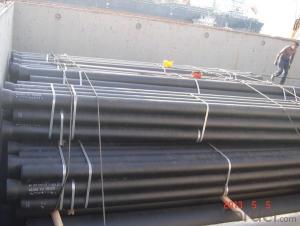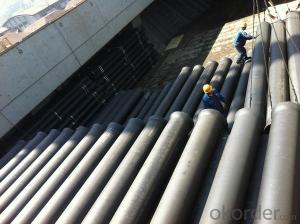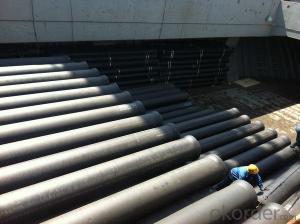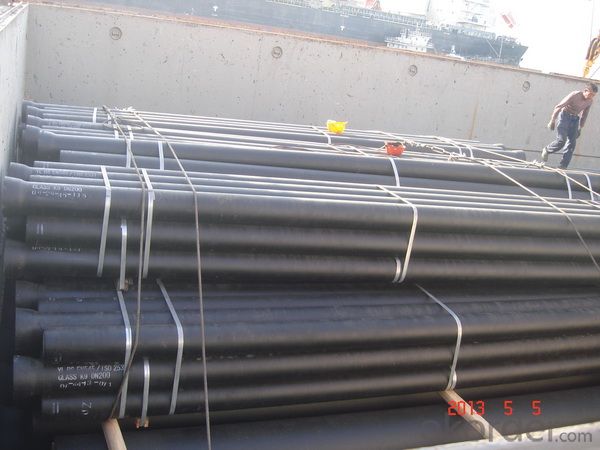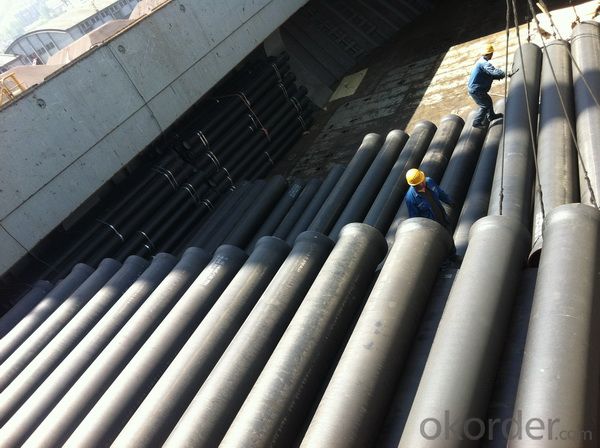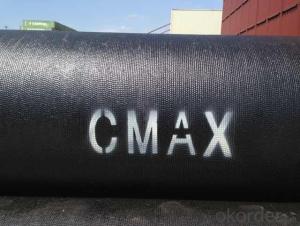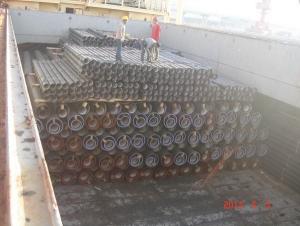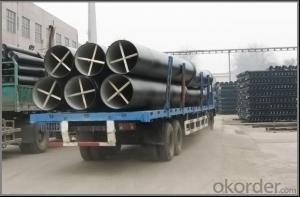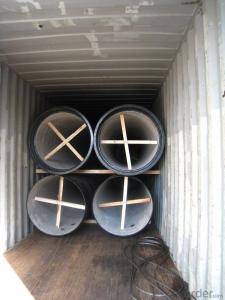DUCTILE IRON PIPE DN200 K7 CLASS
- Loading Port:
- Tianjin
- Payment Terms:
- TT OR LC
- Min Order Qty:
- -
- Supply Capability:
- 30000Tons m/month
OKorder Service Pledge
OKorder Financial Service
You Might Also Like
CNBM ductile iron pipe ranges from DN80-DN1600mm (T-Type, Class K9), effective length 6m, comply with ISO2531 Standard
Company Profile
CNBM International Corporation is the leading production base and renowned supplier of Ductile Iron Water Pipe systems of both potable and waste water in China. We are constantly looking to develop high quality products to ensure the longest service life and wonderful performance.
CNBM Pipelines regard quality as the essential factor leading to successful business. Every pipe is tested in accordance with BS EN545 (water application) or BS EN598 (sewer application). CNBM Pipelines products comply with and are tested according to the relevant European and International Standards. Our pipes are manufactured under the quality management system BS EN ISO 9001. After years of efforts, CNBM Pipelines has built up great reputation in terms of quality and service among customers worldwide
Product Introduction
CNBM ductile iron pipe ranges from DN80-DN1600mm (Tyton, T-Type, Class K7/K8/K9), effective length: 6m, complying with BS EN545/EN598/ISO2531/BS4772.
Specification& Payment terms
Internal lining: Pipes shall have an internal cement mortar lining in acc with ISO4179.
External coating: Pipes shall be externally coated with metallic zinc spray plus a further layer of resin painting to ISO8179.
Gasket: 100% SBR/NBR/EPDM gasket in accordance with ISO4633.
Packing: Pipes from DN100 to DN300 be bundled with steel belts, the others are in bulk.
Payment term: By 30% T/T advance payment + 70% Irrevocable L/C at sight.
Packing: In bulk vessel or in container.
- Q: Can ductile iron pipes be used in areas with high soil acidity?
- Ductile iron pipes can be used in areas with high soil acidity, but certain precautions should be taken to ensure their longevity and performance. Ductile iron pipes are known for their strength, durability, and resistance to corrosion, which makes them suitable for various soil conditions, including those with high acidity. However, high soil acidity can still pose a potential risk to ductile iron pipes over time. Acidic soils can accelerate the corrosion process, potentially leading to the degradation of the pipe material. To mitigate this risk, several measures can be implemented: 1. Protective Coatings: Applying protective coatings to the outer surface of the ductile iron pipes can provide an extra layer of defense against soil acidity. These coatings, such as epoxy or polyethylene, act as a barrier, preventing direct contact between the pipe and the corrosive soil. 2. pH Adjustment: Adjusting the pH levels of the soil can help reduce its acidity. This can be done by adding lime or other neutralizing agents to the soil, which will help create a more favorable environment for the ductile iron pipes. 3. Cathodic Protection: Implementing cathodic protection systems can be an effective method to prevent corrosion in ductile iron pipes. This technique involves the use of sacrificial anodes or impressed current systems to create a protective electrical current that counteracts the corrosive effects of the soil. 4. Regular Inspections: Periodic inspections should be conducted to monitor the condition of the ductile iron pipes in areas with high soil acidity. This allows for early detection of any corrosion or degradation, enabling timely repairs or replacements to be carried out. By implementing these measures, ductile iron pipes can be effectively used in areas with high soil acidity, ensuring their long-term performance and minimizing the risks associated with corrosive soils. However, it is always recommended to consult with experts or engineers familiar with local soil conditions and the specific requirements of the project to determine the most suitable materials and protective measures.
- Q: How does ductile iron pipe perform in seismic conditions?
- Ductile iron pipe has excellent performance in seismic conditions due to its inherent flexibility and strength. It can withstand ground movements and vibrations caused by earthquakes without fracturing or breaking. Its ability to absorb and dissipate energy helps prevent catastrophic failures and ensures the integrity of the pipeline system. Additionally, ductile iron pipe's corrosion resistance and durability make it a reliable choice for long-term performance in seismic-prone areas.
- Q: Can ductile iron pipe be used for industrial wastewater applications?
- Certainly, industrial wastewater applications can make use of ductile iron pipe. Renowned for its robustness, longevity, and corrosion resistance, ductile iron pipe proves itself suitable for a multitude of purposes, including wastewater systems. Its ability to withstand high pressure and endure demanding conditions renders it perfect for industrial wastewater applications that may involve abrasive or corrosive substances. Furthermore, the installation and maintenance of ductile iron pipe are effortless, resulting in reduced costs and guaranteed long-term dependability. Nevertheless, it remains crucial to carefully scrutinize the unique prerequisites of the wastewater application and seek guidance from professionals to ascertain the most fitting pipe material and design.
- Q: How can 4 inch ductile iron pipe be connected with 2 inch galvanized pipe?
- Ductile cast iron used for more than 18 by adding nodulizer, after centrifugal ductile cast iron machine high speed centrifugal cast pipe, called "ductile" (Ductile Cast Iron Pipes), referred to as ball pipe, ductile iron pipe and ductile iron pipe etc.. The utility model is mainly used for conveying water, and is an ideal choice for tap water pipes.
- Q: Can ductile iron pipes be recycled?
- Indeed, it is possible to recycle ductile iron pipes. Ductile iron, a form of cast iron, possesses exceptional strength and endurance, rendering it a favored selection for numerous purposes, such as water and sewage pipelines. Once these pipes have surpassed their useful lifespan, they can undergo recycling and be transformed into fresh merchandise. The recycling procedure comprises the fusion of the ductile iron pipes to extract the iron, subsequently serving as a raw material for the creation of novel ductile iron goods. By recycling ductile iron pipes, not only do we conserve natural resources, but we also diminish the environmental impact associated with mining and the production of new substances.
- Q: Are ductile iron pipes available for cutting and are there any relevant specifications?
- Ductile iron pipes can be divided into cutting and non cutting pipes, the cutting pipe can be cut, and the cutting pipe is usually marked with "scissors" mark in the pipeline.
- Q: How do ductile iron pipes handle internal scale buildup?
- Ductile iron pipes possess exceptional resistance to the accumulation of internal scale, making them highly regarded. The material utilized in these pipes displays remarkable resistance to corrosion, effectively hindering the formation of scale deposits. Moreover, the pipes' sleek internal surface considerably reduces the likelihood of scale adherence. In the unlikely event that scale does commence its formation, ductile iron pipes handle it proficiently. The inherent robustness and durability of ductile iron enable it to withstand the pressure exerted by scale buildup. Consequently, the pipes can maintain efficient functionality, even in the presence of some internal scaling, thereby ensuring a dependable water flow. Nevertheless, it should be emphasized that regular maintenance and periodic cleaning remain imperative in order to prevent excessive accumulation of scale and ensure optimal pipe performance. This can be achieved through a variety of methods, including mechanical cleaning, chemical treatments, or high-pressure water jetting. By adhering to proper maintenance practices, the lifespan of ductile iron pipes can be prolonged, while minimizing any potential issues associated with internal scale buildup.
- Q: Are ductile iron pipes suitable for gravity flow applications?
- Yes, ductile iron pipes are suitable for gravity flow applications. Ductile iron is a strong and durable material that can withstand the weight of the water and solid waste flowing through the pipes without any issues. It has high tensile strength and can resist damage from external forces such as soil movement or heavy traffic loads. Additionally, ductile iron pipes have smooth inner surfaces that promote efficient flow and minimize friction losses. They are also resistant to corrosion and can last for decades without requiring frequent maintenance or replacement. Overall, ductile iron pipes are a reliable choice for gravity flow applications due to their strength, durability, and resistance to various environmental factors.
- Q: Are ductile iron pipes resistant to sulfuric acid corrosion?
- Yes, ductile iron pipes are generally resistant to sulfuric acid corrosion due to their corrosion-resistant coatings and high chemical resistance.
- Q: How do ductile iron pipes perform in freeze-thaw cycles?
- Ductile iron pipes demonstrate exceptional performance in freeze-thaw cycles due to their material properties. With high tensile strength and excellent impact resistance, ductile iron is highly resistant to the stresses caused by freezing and thawing. Unlike other materials, these pipes can withstand the expansion and contraction during temperature changes without cracking or breaking. One of the primary reasons for the success of ductile iron pipes in freeze-thaw conditions is their capacity to absorb and dissipate stresses. The material's high ductility allows for slight deformation under stress, releasing pressure and preventing pipe damage. This characteristic ensures that the pipes can endure repeated freezing and thawing cycles without compromising their structural integrity. Furthermore, ductile iron pipes feature a durable and protective coating, such as cement mortar lining or polyethylene encasement, which further enhances their resistance to freeze-thaw cycles. These coatings offer an extra layer of protection, preventing direct contact between water and the iron and reducing the risk of corrosion. Moreover, ductile iron pipes have an extended service life, often exceeding 100 years, thanks to their inherent strength and resistance to various environmental factors, including freeze-thaw cycles. The pipes' ability to endure these cycles without significant damage ensures the reliability and durability of water distribution systems, even in regions prone to freezing temperatures. In conclusion, ductile iron pipes are highly dependable and excel in freeze-thaw cycles. Their high tensile strength, impact resistance, capacity to absorb stresses, and protective coatings make them the preferred choice for water distribution systems in areas with harsh winter conditions.
Send your message to us
DUCTILE IRON PIPE DN200 K7 CLASS
- Loading Port:
- Tianjin
- Payment Terms:
- TT OR LC
- Min Order Qty:
- -
- Supply Capability:
- 30000Tons m/month
OKorder Service Pledge
OKorder Financial Service
Similar products
Hot products
Hot Searches
Related keywords
